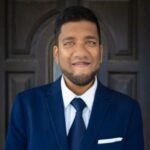Reaz Khan: The Nature of My Deen
One hundred years ago – my ancestors sailed to the New World from very different corners of an undivided South Asian subcontinent. They landed in the Caribbean, worked on sugarcane plantations and eventually opened businesses for economic mobility. Their language was deemed as unimportant by their colonizers and culture began to blend and move towards hybridity. Viewed as not having much; they did have honesty and a sense of which they acclaim is because they were equipped with faith. As a religious minority in their new land and from the port they left, they understood who they were was not about difference, but distinction. They saw it as a duty to share their beliefs with others and not assimilate; but integrate with ease.
Thirty years ago, my parents applied to move to the United States. While I am from this soil- my roots are deep. One generation ago it was planted where the Amazon met the Caribbean Sea; decades prior it was in villages throughout modern day South Asia. The water that has helped it grow derives from a cave in Makkah, with a message inspired by a meeting in the heavens that departed from Jerusalem, eventually greeted by hospitality through migration to Madinah and as far as the Christian kingdom of Abyssinia. The triumph of truth was also internal as strife happened. From the plains of Karbala through sacrifice, the message made its way into the bazaars of Persia and the rolling mountains of Afghanistan. These experiences have shaped who my family are, and the arrival of the egalitarian Islam packaged to them. More importantly, it allows me to hold my head high in dignity. I am tree that will extend my branches to provide shade for those in need. My Islam and our ummah is limitless and borderless. All who utter “la-illaha illul lah, muhamaddur rasullah lah” are mine in faith, and those who do not are my “equals in humanity.”
My identity as a Muslim American is multifaceted. So many readily accept postcolonial labels of nationhood and the boxes people put them into. They struggle with upholding culture and fear it will be lost. If you do not fit into a cookie cutter group, it is easy to be ostracized in circles where that is prioritized. Muslims in America are advantageously positioned because we are united in belief. Our histories can be part of conversation – and it’s a springboard for us to learn about the world. However, we are more than just that. We are Ramadan iftars, jumah salahs next to those of a different race, or smiling at a fellow Muslim and saying salam in the mall or the backseat of a rideshare. We are not just lawyers and doctors-but also coffee shop servers and taxi drivers. We build community not by judging people on their socioeconomics, but rather building our own taqwa, or god consciousness. Our scripture teaches us in the end, that’s what will matter. Loving unconditionally does not end with rectifying how we as Muslims coexist, but starts with ally building. When we learn about others and their beliefs and ways of life, we strengthen the pluralistic fabric of our nation. We inspire others to do the same about us without hate and without fear. We realize our faith and nationality are parallel, not about contradiction.
On the international stage, there is no shortage of groups who do evil in the name of religion or of tribally oriented leaders from Muslim majority nations who have been elevated as the victors of history or benefactors of petrodollars. They abuse their power by saying their narrow interpretations are the only to be followed. Muslim Americans can change that narrative in our local narratives. We may not agree with every foreign policy decision taken by the political leadership of this country. Many do agree however, in this country we can be all we want to be in perfect harmony. That is something we should never lose sight of and work to advance through engagement as our identity continues to flow. May we be a waterfall that provides others with nourishment and refreshment through our actions.


